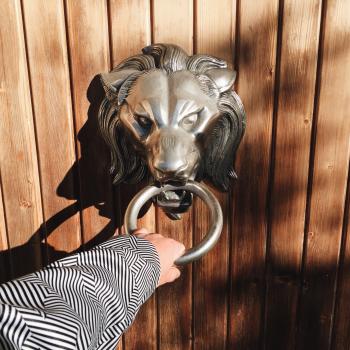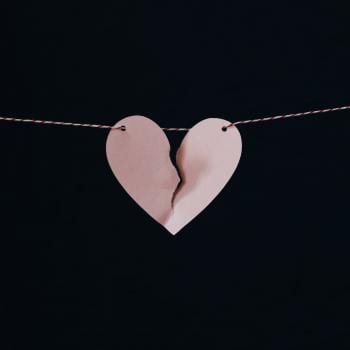In a recent discussion online, I encountered someone claiming that ‘everyone’ knows what the word Witch means so there is no need to define it (or, indeed, use it at all). Witch is a term that is still heavily debated and argued over – my Twitter and other feeds attests to that.
This small interaction highlighted a problem I see throughout our communities: resistance to labels and definitions.
Labels as Limitations
“A label locks me into a definition that people use to control me.” – Craig D Lounsbrough
Many Pagans I have known approach labels from the above quoted viewpoint. Labels are treated as restrictive. Claustrophobic. As if, once we have chosen or been given a label, we are locked only into that one identity. Forever.
But we aren’t just one thing, so we naturally rebel against this perceived straight-jacket. We aren’t just one identity or one self. We all wear many masks. Even when we find identities that fit us, we struggle against the barriers. We find ourselves leaking out.
We seem to expect labels to be perfectly tailored clothes made in our exact preferred style. By their very nature they are not so well-suited. They are better compared to jeans that fit well-enough to wear. Not perfect. Not great. But you can wear them and they work.
Think of how often ‘Pagan’ as a term is argued over. Is it an umbrella term, a ‘big-tent’ one, who exactly gets to call themselves Pagan, who shouldn’t we call Pagan… These are all well-worn discussions. Depending on how some people define it I don’t count as a Pagan. But the word effectively gives an idea about my religious practices, and I do fit into ‘Pagan’ as most people define the word. It is very useful when interacting with people who aren’t part of the many Pagan and polytheist communities, people who may not know or care about the nuances of my identity.
No label is ever going to encompass the entirety of who we are. That really isn’t why we take up labels.
Labels for Communication
I am absolutely the type of person who can go on for an hour about the different labels I use, why I use them, and why they don’t quite fit. But it a community setting, especially a group one where, say, everyone is going around introducing themselves, getting to know each other for the first time, I often find it much better to use the terms the group is going to be familiar with. So, in most general Pagan settings, I introduce myself as a polytheist. I might specify that I do more devotion than anything magical.
Keep it short and simple.
That’s the whole reason I use the specific labels I do.
It would be, ultimately, more ‘honest’ to go on a long tangent about this, that, and the other parts of my practice. But I don’t have time for that, and I know other people don’t have time for that. Getting into the intricacies of who we are and what we do is better saved for more intimate or more focused conversation.
Enabling discussion and allowing us to connect with each other shallowly is one of the purposes of labeling. It helps us signal to each other where our similarities and differences lie. Very big, encompassing labels inform us of broad possibilities of who a person is. More specific or limiting words – like, say, ‘Thelemite’ or ‘Druid’ – tell us more specific details, obviously. But even very specific terminology should be a way to create conversation, rather than shut it down.
That’s where a lot of the issue is, isn’t it? People will sometimes resist labels that objectively apply to them because of bias or prejudice or out of fear of being associated with ‘those’ people. Maybe the community someone is in hates a specific group, like Wiccans (very trendy to dislike them, it seems), so we toss out any consideration for people under that label. Maybe we had a bad interaction with someone who is part of some group or identity and decide that means everyone who uses the label is a jerk.
We can’t just abandon group identities because they’re difficult, though. A big reason is that they can allow us to effectively mobilize together for our rights and freedoms. (The queer community seems to understand this a lot better than the Pagan one, despite how much crossover our communities have.)
Defining Difficult Terms
Of course, if these identities are helpful mainly in communicating something about ourselves, we kind-of definitely need definitions. If we want to be understood, anyway.
How do we define ‘witch’, though? Or ‘Pagan’? Or even ‘Wiccan’? ‘Polytheist’ gets argued over sometimes. (And that is certainly a topic that could be explored. Somewhere else. Preferably far from me.)
What is ‘witchcraft’ and who counts as a ‘witch’ are questions that I find endlessly interesting. How people chose to define witchcraft says a lot about their background, their training, their culture, their own practices, their assumptions… Basically, their everything. Where we draw the lines of our definition or, alternatively, where we fail to draw boundaries tells us a lot about ourselves.
Someone who defines witchcraft so openly as to encompass ‘anything any human does’ probably isn’t going to be a great conversation partner for me, for example. I’m going to find it beyond irritating trying to have a discussion about historical and cultural witchcraft practices with a person that actively doesn’t want to draw limitations around the term.
Witchcraft is a difficult word to define! It’s impossible to define it in a way that makes everyone happy.
So we can’t make everyone happy…but we can come up with definitions that foster discussion within our own pockets of community. This is something I try to keep an eye on whenever I enter a new community, whether online or off. How are they defining their labels? How are these terms being used? Are they being defined at all or are we supposed to just intuitively ‘know’? Knowing how a group is using a term like witchcraft tells me a lot about what to expect, information wise, from them. About how I should approach them and their practices.
And in cases where witchcraft or Paganism is defined as ‘whatever you want it to be, who cares’ it lets me know to get out before I waste my time.
















